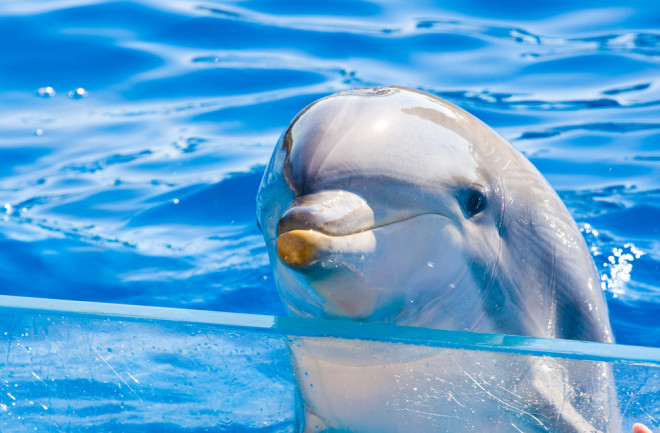Dolphins, often revered for their intelligence and playful demeanor, face a darker reality when confined to captivity. While the iconic smiles might captivate audiences, there's an unseen struggle within concrete tanks that many captive dolphins endure. The phenomenon known as "zoochosis" casts a shadow on their well-being, revealing the psychological toll of confinement.
Zoochosis in Dolphins
Zoochosis, a term coined to describe repetitive, abnormal behaviors observed in captive animals, particularly in zoos and aquariums, is an unsettling reality for many dolphins. This phenomenon stems from the stress and boredom induced by the limited and artificial environment of tanks, leading to behaviors that serve no apparent function.
Head Slamming:
One of the most distressing behaviors associated with zoochosis in captive dolphins is head slamming. Documented in various aquariums, this repetitive and sometimes self-harming action reflects the psychological distress these highly intelligent marine mammals experience when confined. The question arises: Do these head movements hint at an attempt to break free from the confines of their artificial surroundings?
The Emotional Complexity of Dolphins
Dolphins are renowned for their intelligence and complex social structures in the wild. In captivity, however, their highly developed cognitive abilities become a double-edged sword. Confinement in tanks devoid of the vastness of the ocean deprives them of the mental stimulation essential for their well-being.
The Need for Oceanic Environments
Dolphins, by nature, are migratory creatures accustomed to traversing vast expanses of the open sea. The restrictive environment of tanks impedes their natural behaviors, leading to frustration, stress, and the exhibition of abnormal patterns. The call for larger, more naturalistic enclosures to mimic their oceanic homes becomes imperative.
Beyond the Tanks:
The unsettling reality of zoochosis should not overshadow the awe-inspiring characteristics of dolphins. Their intelligence, problem-solving skills, and intricate communication systems are marvels that shine in the open ocean. Dolphins form intricate social bonds, exhibit cultural behaviors, and showcase a level of self-awareness that demands respect.
Conservation and Ethical Considerations
As awareness grows about the challenges faced by captive dolphins, a shift towards ethical considerations and conservation becomes crucial. Marine mammal sanctuaries that provide a more natural environment offer a glimmer of hope, promoting rehabilitation and fostering a connection with the broader conservation narrative.
The heart-wrenching reality of dolphins exhibiting zoochotic behaviors emphasizes the pressing need for change in the treatment of these intelligent beings. Advocacy for stronger regulations, larger enclosures, and a shift towards sanctuaries can contribute to a more compassionate approach to dolphin captivity.
